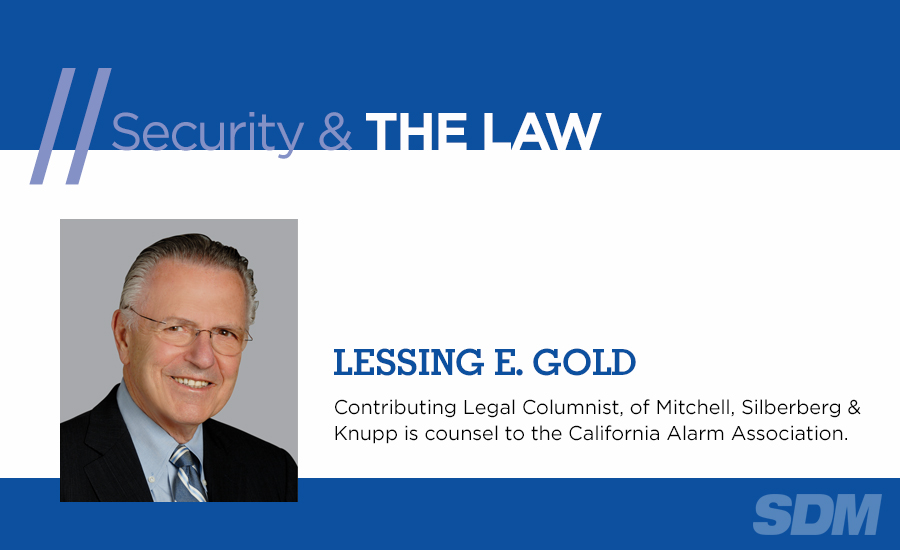In a case decided about a year ago by the United States District Court for the District of New Jersey, the plaintiff, a seller of rare coins, and the defendant alarm company entered into a contract to upgrade and convert the existing burglar alarm system. The plaintiffs alleged that they contracted for the upgraded system because the alarm company would immediately contact the police and the plaintiff if the alarm was triggered so that law enforcement could attempt to intervene and stop a possible burglary.
Burglars broke into the plaintiff’s store by cutting through a wall of the adjoining business to access the rear room. They attempted to cut the alarm panels’ cables, before ultimately ripping the alarm system boxes and panels from the wall.
Upon the burglars’ entry into the store, the alarm system was triggered and the monitoring station was alerted to the entry. The alarm company sent a computer-generated email to the plaintiff stating that the system’s “silent panic alarm” had been triggered, but the defendant did not learn of the email until after the burglary was over because it went into their spam folder.
The plaintiff filed a lawsuit against the alarm company in New Jersey Superior Court. The defendant then filed a motion to remove it to the United States District Court for the District of New Jersey and moved to dismiss the complaint. The amended complaint alleged, in part, breach of contract; breach of the implied covenant of good faith and fair dealing; and violation of the New Jersey Consumer Fraud Act (CFA).
With reference to the breach of contract claim, the alarm company asked the court to enforce the insurer provisions of the contract whereby the plaintiff acknowledged that the alarm company was not its insurer and the plaintiff would look exclusively to its insurance provider to recover for any loss.
The court pointed out that the plaintiff had stated a plausible claim for breach of contract that would not be subject to the provision. Under the contract, the alarm company had an obligation to immediately call the proprietor and the police if the alarm was triggered. Therefore, the court found that the alarm company broke their contractual obligation and these allegations were sufficient to survive a motion to dismiss.
In the breach of implied covenant of good faith and fair dealing allegation, the court found that the plaintiff had not made sufficient factual allegations beyond the breach of the contract. The plaintiff provided no specific claims indicating how the defendant breached its “obligation to perform in good faith” by doing something that “interfered with or destroyed plaintiff’s reasonable expectations under the contract.” Therefore the court dismissed the claim without prejudice.
The court pointed out that the CFA was designed to promote the disclosure of relevant information to enable consumers to make intelligent decisions in the selection of products and services. The CFA thus imposes liability on a person who uses “any unconscionable commercial practice, deception, fraud, false pretense, false promise, misrepresentation, or the knowing concealment, suppression or omission of any material fact with intent that others rely upon such concealment, suppression or omission.”
The court said the plaintiff made no allegations in its amended complaint regarding an ascertainable loss stemming from the alleged unconscionable practices beyond that resulting from a breach of contract. Therefore, the court found that the plaintiff had not sufficiently alleged facts to support all elements of a CFA claim in the pleadings.
READERS ASK
Q: I have been advised by my local attorney that I can add a provision in my contract with my subscriber that the subscriber agrees to waive a jury trial. Can this be done and what is the benefit of not having a jury trial?
A: Some states allow the parties to agree in writing to waive a jury trial, while others will not allow this exclusion. Before incorporating a waiver of a jury trial in your contract, check with your local attorney to make sure it is allowable. With respect to the benefit of waiving a jury trial, in the contract you have provisions or you should have provisions which limit the rights of your customer (subscriber) and protect you on claims of breach of contract and/or negligence, along with an indemnification provision in the event a lawsuit is brought against you. These provisions have been universally upheld by the courts. A jury can be emotional and sometimes prone to overlook the law and the contract terms if they feel that a plaintiff has been unduly harmed. By waiving the trial by jury, you are leaving the case up to a judge who is much more prone to follow the law and the contract and not become emotionally involved. That being the case, it is very beneficial for an alarm company to obtain a waiver of a jury trial where available.



